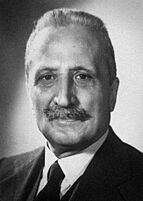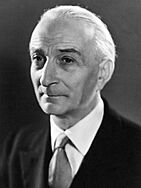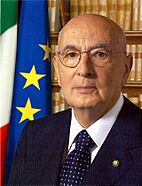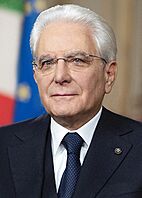List of presidents of Italy facts for kids
- Top left: Enrico De Nicola was the first president of the Italian Republic.
- Top right: Antonio Segni was the first president to resign from office.
- Bottom left: Giorgio Napolitano was the first president to be re-elected.
- Bottom right: Sergio Mattarella is the current president of the Italian Republic and the longest-serving president in Italian history.
The president of Italy is the leader of Italy. This important role is like being the head of the country. Since 1948, Italy has had 12 presidents.
The president's official home is the Quirinal Palace in Rome. Presidents have come from different parts of Italy, including Campania, Piedmont, Sardinia, Tuscany, Liguria, and Sicily. So far, no woman has held this office.
Contents
How the President is Chosen
The president of Italy is chosen by a special group of people. This group includes members from both parts of the Italian Parliament: the Chamber of Deputies and the Senate.
Also, 58 special representatives from Italy's 20 regions join in the vote. Each region sends three representatives, except for the small Aosta Valley region, which sends one. This makes sure that all parts of Italy are included in choosing the president.
The election is done by secret ballot, meaning no one knows who voted for whom. To win, a candidate needs a two-thirds vote in the first three rounds. If no one wins after three tries, then a simple majority (more than half the votes) is enough. The Speaker of the Chamber of Deputies leads the election and counts the votes publicly. The voting takes place in the Palazzo Montecitorio, which is the home of the Chamber of Deputies.
Once elected, the president takes an oath (a special promise) in front of Parliament. They also give a speech to the country. Presidents serve for seven years. Giorgio Napolitano was the first president to be elected for a second term in 2013. Sergio Mattarella was also re-elected in 2022.
Italy's Presidents Since 1948
Here is a list of the presidents who have led the Italian Republic since 1948:
| Portrait | Name | Time in Office | Political Party | Election Year | ||
|---|---|---|---|---|---|---|
| Started | Ended | |||||
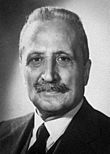 |
Enrico De Nicola (1877–1959) |
1 January 1948 | 12 May 1948 | Italian Liberal Party | 1947 | |
| 132 days | ||||||
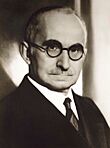 |
Luigi Einaudi (1874–1961) |
12 May 1948 | 11 May 1955 | Italian Liberal Party | 1948 | |
| 6 years, 364 days | ||||||
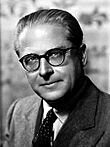 |
Giovanni Gronchi (1887–1978) |
11 May 1955 | 11 May 1962 | Christian Democracy | 1955 | |
| 7 years, 0 days | ||||||
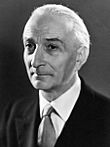 |
Antonio Segni (1891–1972) |
11 May 1962 | 6 December 1964 | Christian Democracy | 1962 | |
| 2 years, 209 days | ||||||
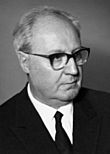 |
Giuseppe Saragat (1898–1988) |
29 December 1964 | 29 December 1971 | Italian Democratic Socialist Party | 1964 | |
| 7 years, 0 days | ||||||
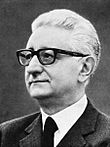 |
Giovanni Leone (1908–2001) |
29 December 1971 | 15 June 1978 | Christian Democracy | 1971 | |
| 6 years, 168 days | ||||||
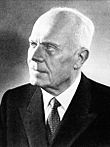 |
Sandro Pertini (1896–1990) |
9 July 1978 | 29 June 1985 | Italian Socialist Party | 1978 | |
| 6 years, 355 days | ||||||
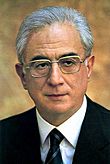 |
Francesco Cossiga (1928–2010) |
3 July 1985 | 28 April 1992 | Christian Democracy | 1985 | |
| 6 years, 300 days | ||||||
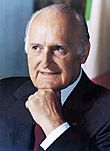 |
Oscar Luigi Scalfaro (1918–2012) |
28 May 1992 | 15 May 1999 | Christian Democracy | 1992 | |
| 6 years, 352 days | ||||||
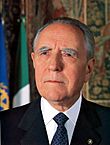 |
Carlo Azeglio Ciampi (1920–2016) |
18 May 1999 | 15 May 2006 | Independent | 1999 | |
| 6 years, 362 days | ||||||
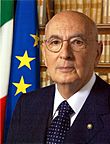 |
Giorgio Napolitano (1925–2023) |
15 May 2006 | 14 January 2015 | Democrats of the Left / Independent |
2006, 2013 | |
| 8 years, 244 days | ||||||
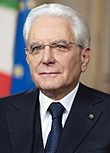 |
Sergio Mattarella (born 1941) |
3 February 2015 | Incumbent | Independent | 2015, 2022 | |
| 11 years, 21 days | ||||||
What Happens if the President Can't Serve?
If the president of Italy is unable to do their job (for example, if they resign or are very sick), another person steps in. This person is called the Acting President of the Republic. This role is not directly written in the Italian Constitution, but it comes from a rule that allows someone to take over.
Only Enrico De Nicola had an official title as a temporary head of state. He even lived in the Quirinal Palace. Other people who have stepped in took on the president's powers, but not the official title. After Italy's Constitution was adopted in 1948, the president of the Senate is the person who takes over if the President of the Republic is absent.
More to Explore
- Lists of office-holders
- King of Italy, for past Italian leaders before 1946
- List of prime ministers of Italy
- Politics of Italy
- Prime Minister of Italy
Find Out More Online
- Presidenza della Repubblica – This is the official website of the President of the Italian Republic.
it:Presidenti della Repubblica Italiana#Elenco dei presidenti della Repubblica Italiana
 | Roy Wilkins |
 | John Lewis |
 | Linda Carol Brown |


